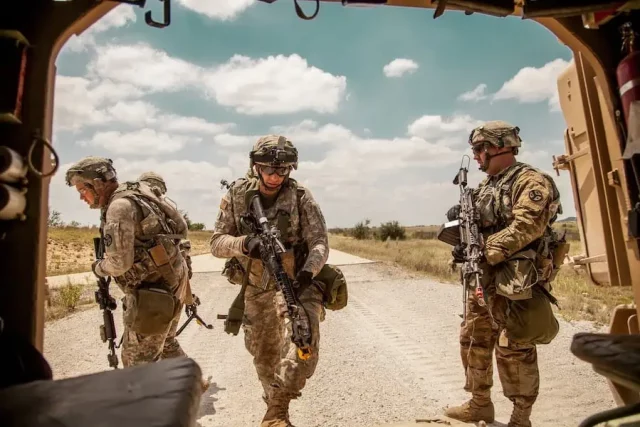So, why did Russia leave the war? They verbally agreed with the allies to hold their ground and prevent the Germans from moving their reserves from the war front to another territory.
Unfortunately, the Russians didn’t keep their end of the bargain. Of course, their allies weren’t happy. They became the weak link during the heat of the First World War.
The Russians agreeing with the allies to hold their grounds means they were ready to do as agreed. But there were unavoidable reasons they had to go back home.
So, let’s discuss why the Russians left the First World War.
Why Did Russia Leave The War?
The Russians left the First World War to focus on other matters they considered more pressing. And there were several reasons they left the war to return home.
Firstly, they had recorded massive losses. Another reason was the interest of the Bolsheviks, the Russian Communist leader who took power in 1917.
The Russian armies also left the war because a civil war was raging at home, which was a huge setback. They prioritized saving their country over doing the bidding of their allies.
Besides, the war had already become unpopular back home. So, the Bolsheviks focused on winning the civil war in Russia.
The Russians also thought the Germans would lose the war sooner than later. They believe they’ll run out of material, which would be their downfall.
Why The Russians Broke The Triple Entente With The Allies
We have given a breakdown of why Russia left WWI and returned home. But we believe summarizing the reasons doesn’t do justice to the Russians, nor the Triple Entente they were a part of.
Russia was part of a Triple Entente (an informal understanding) with Great Britain and the French Third Republic.
Here is a comprehensive detail on why the Russians deserted the First World War and broke the Triple Entente with their allies.
1: The cost of the war:
The First World War happened, and the stakes were high for several allies. Unfortunately, that wasn’t the case for the Russians. They consider the war expensive for several reasons. Plus, the Russians weren’t going to gain much from it.
How was the war expensive for the Russians? The Russians lost a lot of men at the hands of the Germans. But then, they can take solace in the fact that Austria-Hungarians suffered more losses.
With around 5.5 million soldiers out of 16 million wounded and killed, the stat does appear to favor the Russians, compared to France and Germany. The Russians would claim fewer deaths than the Germans and French, but that isn’t the case.
When you consider other stat such as the number of Russian soldiers missing (500,000), prisoners of war (3 million), disabled (1.1 million), Refugees (6 million), and thousands of civilian victims, you’ll understand the massive losses the Russians sustained in the First World War.
As if the rising death toll wasn’t enough, the Russians started suffering food shortages back home. In addition, they began losing territories faster than they were gaining.
Those back home thought the war wasn’t necessary because of the losses and the implication it had back home. Besides, they saw that their country wouldn’t gain much from the war.
Tsar Nicholas II suffered a massive drop in his popular rating. He completely lost touch and the goodwill he was enjoying from the public. The Tsar was no longer famous, and many thought he wasn’t in control of his government anymore.
The public’s mindset was that something or someone was controlling the Tsar. While some claim his German-born wife could be responsible, others believed he was a puppet in the hands of some particular interest group.
Anyone would agree that Russia was hardly a democracy then or now. Nevertheless, public opinion remains powerful. Thus, if you’re a Russian leader, a low popularity rating should leave you scared.
The public’s discontent towards Tsar Nicholas II was evident in how several underground organizations sprung up fast. These organizations had one aim: to work against the Tsar’s policies.
The country was on the brink when laborers started their strikes. The labor strikes impacted the Russian industries in the worst possible way.
2: The start of a revolution:
With the population rising against their leader, Tsar Nicholas II, it was only a matter of time before a revolution began.
In March 1917, the country witnessed massive demonstrations across the length and breadth of the Russian capital of Petrograd. The protests became intense that the Russian military leaders and parliament started pressuring the Tsar to act.
On March 15, 1917, the Tsar’s regime crumpled under pressure. He surrendered on March 15, an event regarded as the February Revolution.
The revolution in Russia was a big blow to the country and its allies. We can agree that it came at the wrong time for all parties involved in the war, excluding the enemies, who at that time were the Germans.
The war divided the Russian military and caused a great distraction in their camp. While some were busy fighting on the war front, some felt they had to return home. So, they stopped fighting and went home. Other groups were fighting themselves.
The February Revolution presented the Germans with a huge opportunity to strike. But this time, they wouldn’t use their diminishing weapon but an insider. They arranged to help the Russian revolutionaries in Europe, and Vladimir Lenin made himself available.
The Germans fulfilled their promise. They provided a train for Lenin, and on April 16, he was in Russia, Petrograd.
3: Effect of the last Russian offensive:
The February Revolution made Russia more vulnerable. The war’s participants, allies, and enemies started paying close attention to Russia. Why? They knew Russia didn’t have a tsar and were waiting to see what it would do without one.
The exit of Tsar Nicholas II paved the way for a provisional government to preside over the affairs of Russia, but it did little to calm the restiveness down. The situation in the country remained unstable, even in the military.
The Russian military saw the challenges the country’s military formations faced and devised a way to boost their morale. Alexander Kerensky, the then minister of war, ordered Russian armed forces to open a series of new offensives along the eastern front.
Unfortunately, the people didn’t fancy Kerensky’s new order. They felt their country shouldn’t be discussing war and thought it should have exited it. So, his latest order angered the people of Russia. Thus, an antiwar rally took place the following day.
The people occupied Petrograd’s entire length and breadth, voicing their displeasure about the war.
The Russian forces carried out Kerensky’s order and pushed forward. They advanced initially and had some successes against the Austrian military formations in Galicia.
Unfortunately, the German reinforcements made the Russian forces scared. It made them flee from their positions quickly.
Most Russian forces held their ground on the eastern front, and fighting continued from July to August. Again, the Russians needed to be more effective. There were massive infighting, dissertations, and disorders that caused huge distractions.
4: The effect of the Bolshevik Revolution:
Russia remained in the war throughout the summer and fall of 1917. But throughout this period, the country’s participation in the war was under scrutiny and heavy criticism by the public.
There was a massive disagreement in Russia, as many believed they should exit the war and the condition under which they should do so.
Alexander Kerensky, heading the provisional government, had a different view.
Kerensky’s position was to remain in the war until Austria-Hungary and the Germans fell. But the group, called the Bolsheviks, had an opposing view. They wanted Russia to exit the war with immediate effect and not mind the consequences it would have.
At last, the people’s wish is finally coming to fruition. The Bolsheviks, a group with a more radical leaning, seized control of the country. But that wouldn’t have been possible without the help of the military.
Vladimir Lenin, the Bolshevik leader, gave his first decree when he took over office. He declared that Russia was at peace, ordering the Russian forces to stop all hostilities.
However, although the country’s exit from the war was complicated, and Russia would lose several territories, Lenin didn’t care. He forced the allies to sit at the table and discuss peace with the Germans, Austria, and Hungary.
After several negotiations, a cease-fire deal was reached on December 15, 1917. But it took several months for a peace deal to be achieved.
Russia lost several territories following the peace deal. They lost Finland, Estonia, Latvia, Ukraine, Poland, Lithuania, Belarus, and many others.
Conclusion
So, why did Russia leave the war? They left due to several reasons. One was the heavy losses they were sustaining. Another reason was the civil war that broke out at home.
The war became unpopular among the Russian population over time. Many didn’t see any reason the Russian leaders should continue in the war and wanted their forces to return home.
Tsar Nicholas II wanted Russia to continue in the war. Kerensky, who became the provisional leader when the Tsar left office, also had the same idea. Finally, Vladimir Lenin became the country’s leader, leading Russia out of the war.














